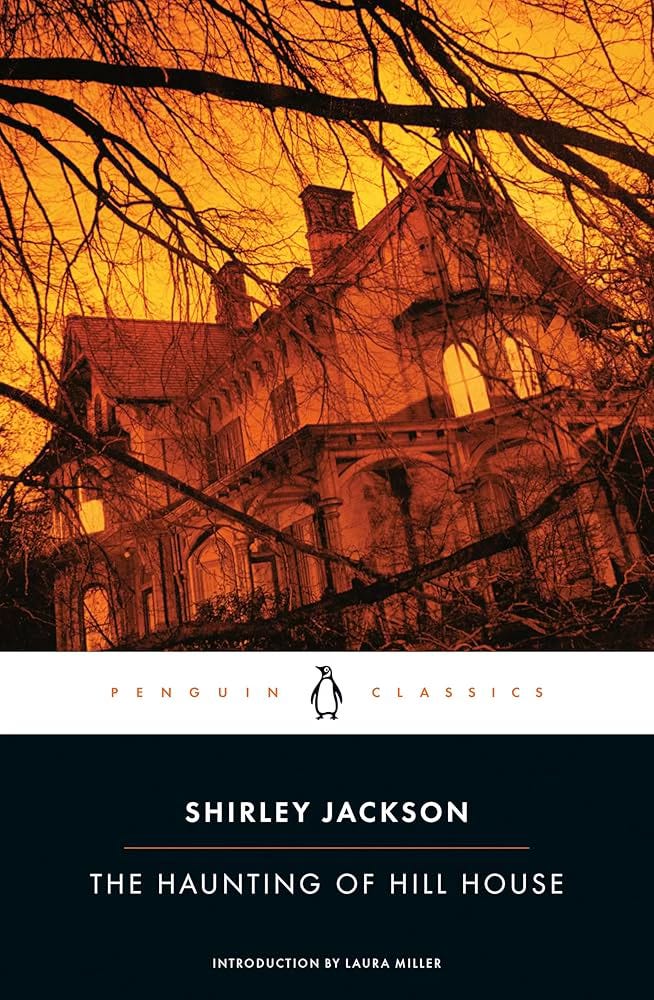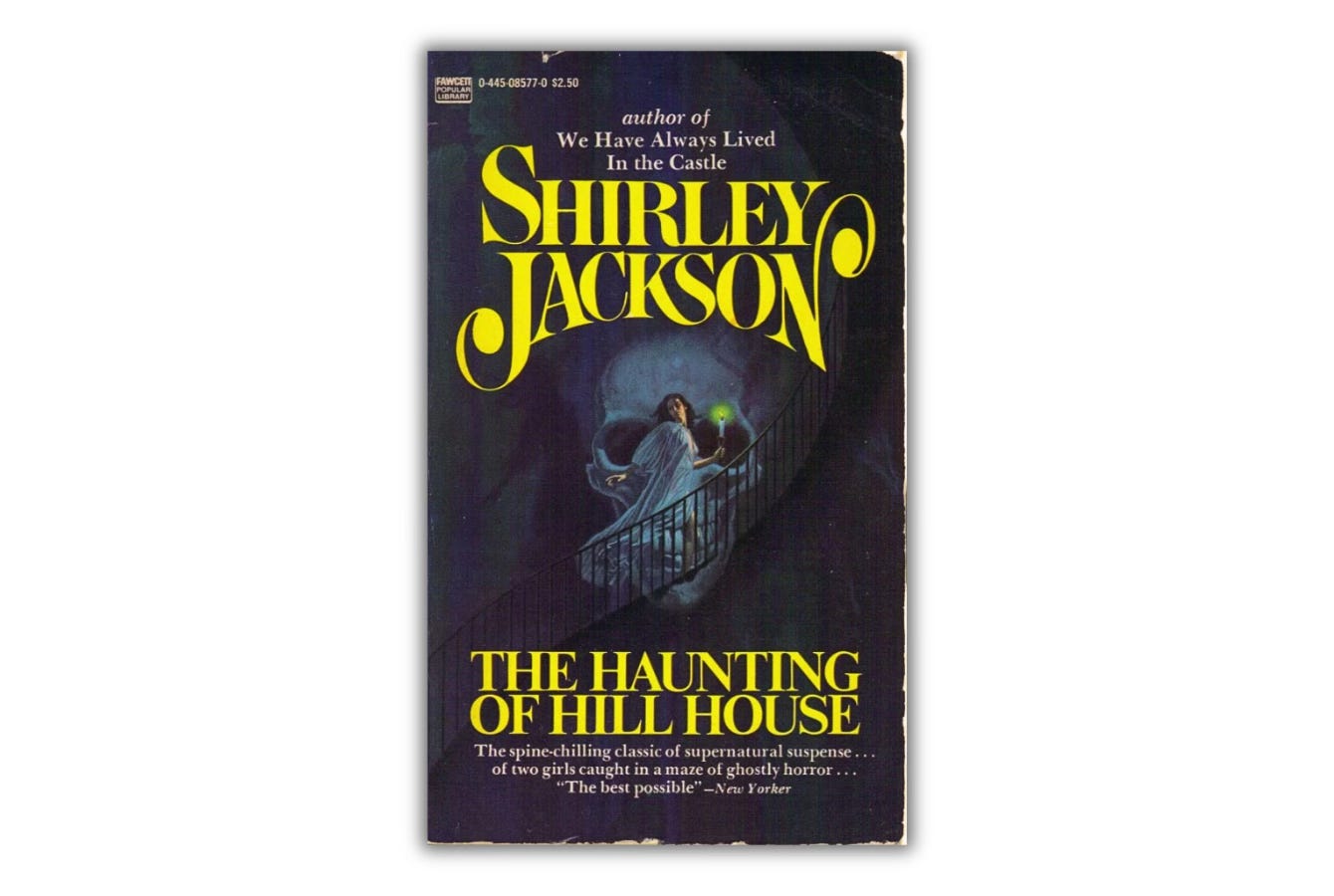Haunted by Choice
"The Haunting of Hill House" isn't just ghosts and haunted houses and family trauma — it's also about being unable to choose a pen.
I hate the phrase “first world problems”, if only for its cringe-inducing note of virtue signalling. Still, there are problems and there are problems. Like the other week when I was blank-faced staring at my books for an unmentionably stupid amount of time, because I couldn’t decide what to read. I thought, ‘Okay, this is a first world problem.’
There’s north of a thousand books bending the shelves of my cheap bookcases, so it wasn’t a lack of something to read. It was a surplus of novels calling for my attention. I had to extinguish all the possible worlds of reading to keep one actual universe alive. I’d pick a novel, think about the other novels I’d be missing out on, then put it back and repeat the process with a novel two or three doors down. All while dead-eyed staring at a wall of books.
I read a story in a memoir (maybe) by a professor (I think) about going into a store and finding one of his (or her) students paralysed in front of a wall of pens. The student had been unable to choose a pen for twenty minutes. This was America soon after the Cold War. She’d grown up in Soviet Russia. Back home, she said, there was one type of everything and your only choice was yes or no. Sometimes you didn’t even get that. Here, with ninety versions of two types of pen, she was overwhelmed. Stuck.
Bored of indecision, I grabbed the nearest novel that might match my mood: Shirley Jackson’s The Haunting of Hill House. A re-read perfectly suited for that moment — because Hill House is about ghosts and haunted houses and family trauma, sure, but it’s also about being unable to choose a pen.
Hill House opens with that near-perfect paragraph that gets everyone excited and, rightly, tops many lists of literature’s best openings. It’s so widely discussed that it’d be a little boring to discuss it much further (but it’d be even more boring to pretend it doesn’t deserve that attention), so we’ll skip to the start of the story, where a death sets a young woman free.
Eleanor Vance — actually thirty-two, emotionally closer to a teenager — has spent her adult life caring for her mother, until her mother died. Nothing now will stop Eleanor finally exploring the world. Luckily, the previously unknown Dr Montague invites her to investigate “psychic disturbances in a house commonly known as ‘haunted’.” Eleanor gets in her car, leaves behind her cage in the city, and heads to Hill House, the place she’ll never leave.
Driving cross-country, Eleanor daydreams about other lives she might live, imagining a garden where she’ll “live happily ever after”, then a kingdom that turns into “a soft green picture from a fairy tale”. She could travel down this road or explore that lane, pick this life or that one, but instead she keeps putting it off. “Another day,” she thinks, “I’ll come back and break your spell.” For now, she wants to remain dazzled by the enchantment, preferring the open road and its endless choice.
This is what freedom looks like to her: an endless open road. To Eleanor, deciding on something looks like getting in a cage. She stubbornly kicks her feet and waves her arms against anything that feels restrictive, but she fails to see how this restricts her.
Later on her journey, she watches a little girl in a café refusing to drink milk from an ordinary glass. She wants her “cup of stars” that she left at home. Eleanor also wants to drink from a cup of stars. When the girl’s parents try to cajole her into using a plain cup, because it’s milk from this one or no milk at all, Eleanor wills the girl to rebel, because “once they have trapped you into being like everyone else you will never see your cup of stars again”.
Eleanor’s turned the absurdity of cultural relativism into something that’s somehow worse: personal relativism, which insists on a cup of stars for each person, or a cup of planets if you prefer, or no cup at all if your tastes go that way. An individually tailored view of reality at any cost, even though we usually end up paying the price ourselves. The little girl wins the battle over drinking from the ordinary cup, but that means she doesn’t get anything to drink. She’s sort of free, but she’s left thirsty.
Eleanor arrives at Hill House, where she meets Theo, who moves with laughter and “a rush of floral perfume”, and Luke, who’s “a liar” and also “a thief”. They’re overseen by Dr Montague, who uses his title “to borrow an air of respectability, even scholarly authority, from his education” because his investigations are “utterly unscientific”.
On their first night in Hill House, they play a game of making up autobiographies for people they’ve never been, from a princess to a bullfighter to living “a mad, abandoned life ... going from garret to garret”. This is a game Eleanor plays by herself throughout Hill House, slipping in and out of personalities and lifestyles as if changing her clothes.
Re-reading this scene, I remembered how much Eleanor irritated me the first time we met. She reminded me of myself when I was a sixteen-year-old goth, and I thought my identity wasn’t just expressed by piercings and make up and clothing, but could be strong-armed into existence by those things — like styling my hair into a mohican instead of a long fringe changed me from a shy kid to a confident one as easily as it turned me from an emo to a punk.
This time I felt more patient towards Eleanor (towards my younger self?) and thought her shapeshifting identity was a response to anxiety. Maybe, I thought, she’s worried about losing her newfound freedom from duty. If she can become someone new when a responsibility becomes a burden, she can “free” herself from unwanted burdens. There’d be no need for soul searching — she can just torch the old soul and pick a new one.
Later in the story, Dr Montague says, “I think we are only afraid of ourselves,” and Luke says “No ... Of seeing ourselves clearly and without disguise.” Not bad for a thief and a liar who cheats at cards. Maybe it takes a liar to see the truth. Hill House can apparently see them clearly and without disguise. Montague says the house “can find out the flaws and faults and weaknesses” in all of them and break them apart:
“We have only one defense, and that is running away. At least it can’t follow us, can it? When we feel ourselves endangered we can leave, just as we came.”
There’s that idea again that if you want out you can just leave. Eleanor’s scared of being locked up like she felt in her mother’s house, so she runs from anything that looks like it has bars, and she’ll be running forever until she works out that not everything that keeps you in one place is a cage. Sometimes it’s an anchor keeping you where you need to be.
When I think about the people who seem most free — by which I mean unburdened by indecision, directed toward a purpose, deeply satisfied — I notice they’re people who give themselves over completely to something bigger than themselves. Parents, artists, teachers, students, the spiritually devout and the secularly devoted — they’re all, in one sense, less free than the libertine but, in a better sense, so free that they’ve stopped obsessing over freedom.
When I think about when I’ve felt truly free — the kind of free where you’ve stopped planning to live and you’re just getting on with living — it came only when I’d traded my self-centred “libertarian freedom” for a small place in something big. That deep kind of freedom comes when I’ve chosen instead of when I’m choosing. It’s the difference between having arrived and aimlessly wandering.
Imagine Eleanor at a roundabout in her journey to Hill House. There are other roads she could take, but choosing one means losing the others. Like a spinning top, she circles uselessly around until she runs out of gas. Or she takes road number one, but she’s bothered about what she’s missing down the other roads, so she turns back and drives down road number two, until she gives up on that one to try road number three. She winds up at the roundabout again and again, circling the drain.
What if she sacrificed some freedom of choice by choosing one road and committing to it? She might as well; she can’t go on indefinitely into an infinite sunset on a perpetually unrolling road. Eventually, she has to arrive somewhere, and if she doesn’t choose the destination, it’ll choose her.
And — as Eleanor finds out in an ending that earns the word haunting — she might not like what chooses her.





I haven't read any Shirley Jackson since we read The Lottery in high school. It was incredibly disturbing to me, which I know is the point, but it really turned me off Jackson as an author. I've seen several recommendations for The Haunting of Hill House recently. Just how scary is it? I tend to avoid such things in general. Unlike you, I am not a fan of spooky season? :)